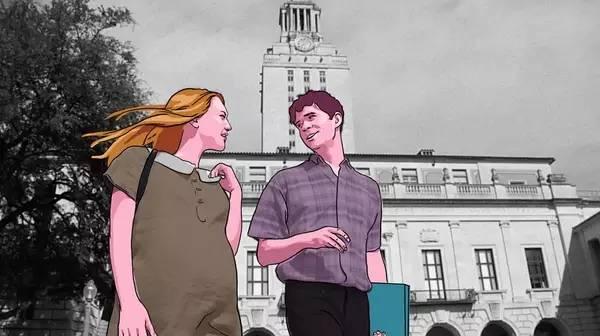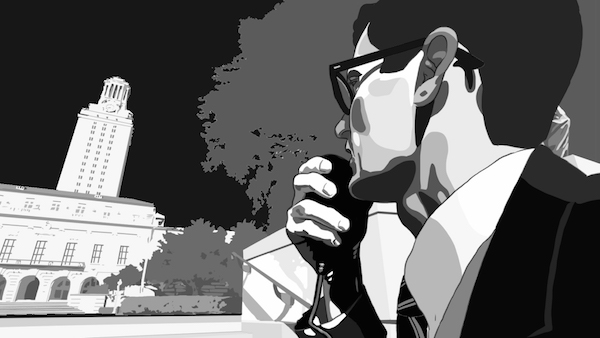Tower Review
At the onset, it might seem insensitive to tell the story of a deadly mass shooting using rotoscope animation, but after you settle into the style of filmmaker Keith Maitland’s “Tower,” you realize how useful (and even powerful) a tool animation can be to tell a story that largely exists in fragments of witnesses’ memories.
Maitland pieces together the horrifying 90 minutes on a sweltering summer day — August 1, 1966 — when a lone sniper essentially took the University of Texas at Austin campus hostage from the top of the campus clocktower, killing 16 people and wounding more than 40. With only testimonials and scarce video, audio, photos and news media coverage of the event at his disposal, Maitland mostly turns to animation to fill the gaps and relate what actually happened as completely as possible. The finished product is as close to a moment by moment account of the shooting — from the perspective of those who lived through it and were closest to the action — as possible.
Most filmmakers would shy away from a subject like this. There’s not much to work with, it could feel too exploitative of people’s trauma and live action reenactments of what happened would come across as inauthentic if not comical. But the rotoscoping effect, and Maitland’s choice to animate his subjects as they looked in 1966, casting actors to play them in animated reenactments and to read their testimonials with younger voices, addresses all these concerns. It’s as if Maitland dips part of the documentary in fiction just so that it can all come together more cohesively. Instead of cutting frequently between the real and the reenacted, he blends to the two.
This also turns “Tower” into a captivating, pulse-pounding retelling of events, almost as if it were a feature film. For those unfamiliar with story, it’s all the more engrossing, and kind of jaw-dropping when you consider that it all actually happened. Adults young and old today have no shortage of mass shootings to draw from in their minds, but few lasted 90 terrifying minutes like the UT-Austin tower shooting. That makes it all the more important to create the vivid account we get in “Tower.” What the witnesses and survivors experienced doesn’t deserve to be reduced.
As has been the case with most media accounts of mass shootings, the focus always turns first to the shooter — who could be so evil and/or disturbed to take human lives this way? This was especially the case in this shooting; the attention was turned to the perpetrator and not the victims (and heroes) by magazines and broadcast media, some of which we see in the film. “Tower” almost entirely ignores who Charles Witman was and instead gives the narrative of events back to these victims and heroes. Maitland wants to honor their experiences and dig deeper into how they remember and process trauma instead of heaping attention on the selfish individual responsible for it all.
Again, it might seem like rotoscoping would work counter to this objective by obscuring the film’s subjects in portraying them as “cartoons” with professional actors’ voices, yet Maitland navigates that creatively as well and shows us that authenticity doesn’t only come from the way someone looks or sounds, but that their “voice” is their story. The rotoscoping actually forces us to focus on their story and only their story. It allows us to live in those moments, rather than the person’s recollection of those moments.
“Tower” stands out as a piece of creative, resourceful documentary filmmaking, one that allows the director to tell a complete story from disjointed pieces, and an absolutely gripping story at that. You might argue that this method and style allows Maitland to exert a bit too much of his own influence over the film, but his creative license largely comes in the form of accents that honor rather than exaggerate the stories of his subjects. Regardless, “Tower” raises the bar for how documentary stories can be told.
4.5/5 Stars
Tower
Directed by Keith Maitland






0 Comments
You can be the first one to leave a comment.